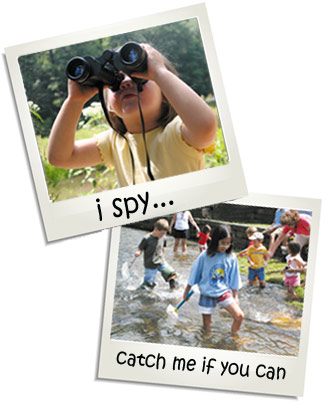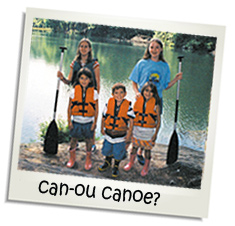 |
 |
|
A Resource for Athens Area Families
|
|
But the days when children can't wait to get outside and play unsupervised for hours may be a thing of the past. Today we lead busy, highly scheduled lives. We get off of work and shuttle our children to sports practice and music lessons. Then we rush home in time to feed them, help them finish homework and get them into bed. This leaves them with no unscheduled time. When we do have some down time, most of us don't feel comfortable letting our kids roam free through the neighborhood without supervision. In fact, experts estimate that a child's range for roaming and wandering today is one ninth of what ours was.
And besides, many kids will tell you they don't want to go outside. Why would they choose the challenges of the outdoors ("That's boring mom!") when they can be easily entertained by TV, video games and the internet? But our highly structured lives, lived primarily indoors, are not good for our children's health. Today we are raising a generation of children who have lost their connection with the outdoors. It is a crisis that has become known as "nature deficit disorder." The result? In his book Last Child in the Woods: Saving Our Children From Nature Deficit Disorder, Richard Louv shows that this disconnect may play a big role in increased rates of obesity, Attention Deficit Hyperactivity Disorder (ADHD), depression and stress in our children. Pediatric care providers are particularly tuned into the problem of reduced time for unstructured play. They've known for a long time that getting children out and moving burns calories, and thereby lowers the risk of childhood obesity. But new evidence is showing other benefits to outside play besides obesity prevention. A recent report from the American Academy of Pediatrics (AAP) states that free and unstructured play is healthy and in fact essential for helping children reach important social, emotional and cognitive developmental milestones. Unstructured play, whether it is indoors or outside, helps children manage stress and become resilient. Fortunately, "nature deficit disorder" is a problem that parents and communities can solve. Spurred by the publication of Louv's book, a movement referred to as "No Child Left Inside" is sweeping the nation. Connecticut has launched a program to get children and parents out to state parks and provide more outdoor opportunities. Many school districts are restoring previous cuts in outdoor playtime and are investing in outdoor classrooms where children can learn through direct contact with nature. And in some communities, developers are rethinking how they build neighborhoods to include areas where children can play safely. Health care providers are also addressing this problem. As a result of the AAP report on children and play, health care providers have been given new guidelines for patients and parents, which include recommending that all children be afforded ample, unscheduled, independent, non screen time to be creative, to reflect and to decompress. Health care providers are also encouraged to be advocates for developing safe spaces for children to play. Athens area parents are lucky to have many opportunities to get their children outside. The Leisure Services Division manages a network of safe parks where parents and children can spend time outdoors picnicking, walking, biking, canoeing, bird watching, and testing their creative limits on the playground. Facilities like Sandy Creek Nature Center and the State Botanical Garden of Georgia have extensive trails and outdoor programs where children can personally connect with plants, animals and the outdoors. And this year, Greenfest (mid April through mid May) will offer plenty of chances for parents and kids to get outdoors. This year's theme is "The Green Hour," which is based on a National Wildlife Federation program that challenges children to engage in an hour of unstructured, outdoor play each day. (Visit www.athensgreenfest.org for a list of events and more information on Greenfest's "Green Hour" challenge). Time is one of the most valuable resources, so reserve some of it for your kids to get outside and play. It's not just for fun. Their health depends on it. (Research and statistics taken from Last Child in the Woods: Saving Our Children from Nature Deficit Disorder by Richard Louv.) Kyla Hastie is an outreach coordinator with the U.S. Fish and Wildlife Service and volunteers with Friends of Southeast Clarke Park. Shani Howard is a nurse practitioner at Oconee Pediatric Associates. Both have two daughters, who they strive to keep connected with nature. Learn more about nature deficit disorder and the AAP's study on the importance of play at:
|
. |
|
|
|
© 1998 - Athens Parent, Inc. All
rights reserved.
Reproduction in whole or in part without permission is prohibited. |
|
Send comments or suggestions to: webmaster@athensparent.com
|
 For many parents, some of our best childhood
memories are of the outdoors. Whether it was playing neighborhood
freeze tag, building a fort in the nearby vacant lot, splashing
around in a creek or riding a bike to the park, most of us had
a lot of fun playing outside.
For many parents, some of our best childhood
memories are of the outdoors. Whether it was playing neighborhood
freeze tag, building a fort in the nearby vacant lot, splashing
around in a creek or riding a bike to the park, most of us had
a lot of fun playing outside. As Louv says, "Healing the broken bonds between our young and
nature is in everyone's self interest, not only because aesthetics
or justice demands it, but also because our mental, physical and
spiritual health depend upon it."
As Louv says, "Healing the broken bonds between our young and
nature is in everyone's self interest, not only because aesthetics
or justice demands it, but also because our mental, physical and
spiritual health depend upon it."
